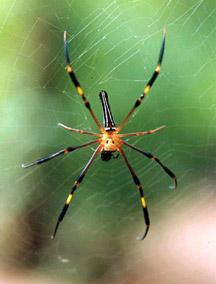By:Prashant Mahajan
Conservation Education Centre, Bombay Natural History Society
Spiders evoke varied responses among human beings. Scary to some but amazingly skilled and colorful web wavers-spiders are one of the most misunderstood creatures we live
with. Spiders lack backbone in their body and are mistaken for insects. They are arachnids related to scorpion, ticks and mites. There are about 30,000 species of spiders distributed across the world, of which 1035 species are found in India. All the spider
species are carnivorous and feed only on living prey.
 Some of the spider species have eight eyes! The Jumping spiders have six small and two large eyes giving them almost 360-degree vision. They are day hunters with good
colour vision and rely on sight to catch prey. They use their small eyes, with a wide field of view, to detect movement, and the large eyes, with a narrow field of view and sharp vision, for precise tracking. To focus its large eyes on the target, the spiders
moves its retina while the lense remains fixed, and the eye colour changes: the spider is looking straight at you when the eye is darkest.
Some of the spider species have eight eyes! The Jumping spiders have six small and two large eyes giving them almost 360-degree vision. They are day hunters with good
colour vision and rely on sight to catch prey. They use their small eyes, with a wide field of view, to detect movement, and the large eyes, with a narrow field of view and sharp vision, for precise tracking. To focus its large eyes on the target, the spiders
moves its retina while the lense remains fixed, and the eye colour changes: the spider is looking straight at you when the eye is darkest.
All spiders are venomous for their prey. Only few are highly venomous, which can kill human beings. However we do not have such species in India. In some species of spider,
female is much larger than male. e.g. Giant wood spider, which is found through out the western ghats, is seen during winter months. The female of Giant Wood is known to feed on male spiders, if approached wrongly. They can trap and feed on small size birds
like warblers. However, certain species of sunbirds use the nests of social web spiders for their nest.
The role of spiders as ‘pest controller’ is little known. The giant crab spiders feed on cockroaches while wolf spiders eliminates brown plant hopper, detrimental to paddy
fields. Deforestation and indiscriminate use of pesticides are eliminating many beneficial spider species.
(Photograph of the Giant Wood Spider is by Prashant Mahajan)